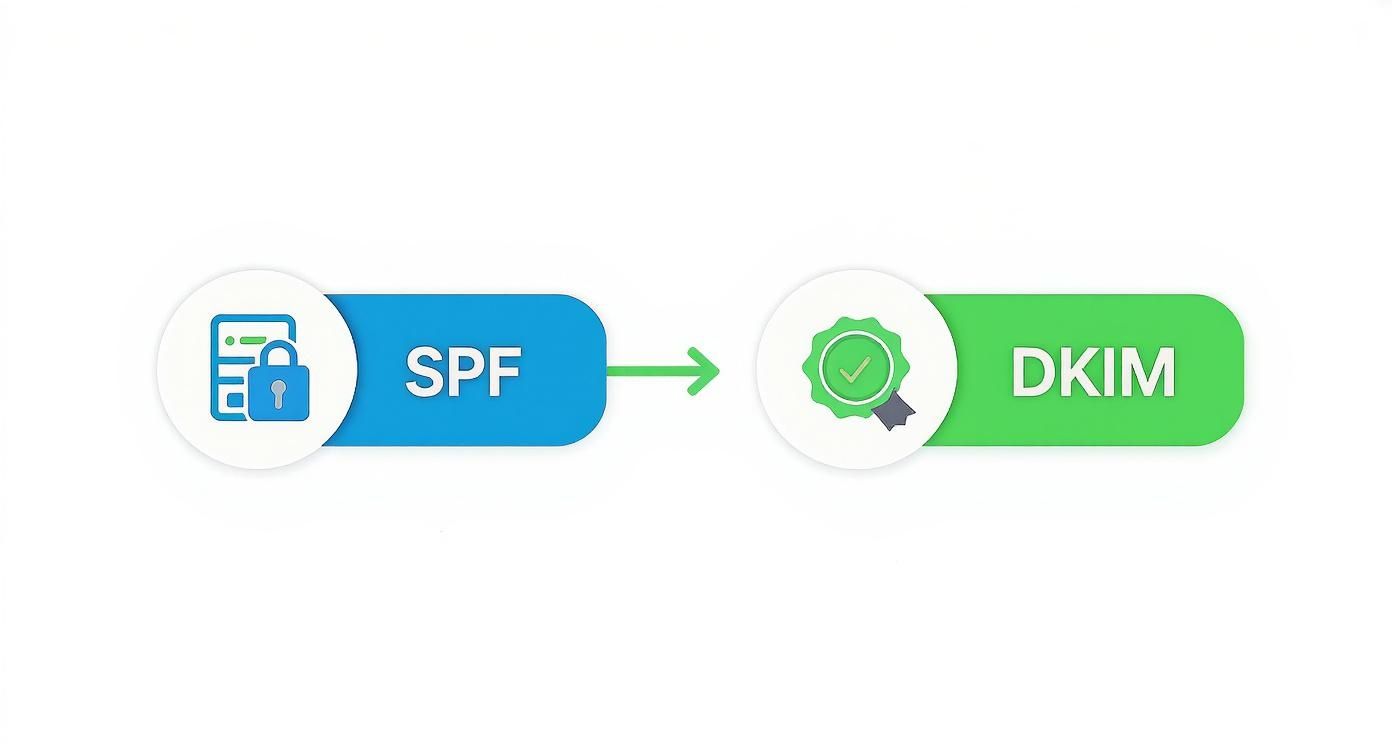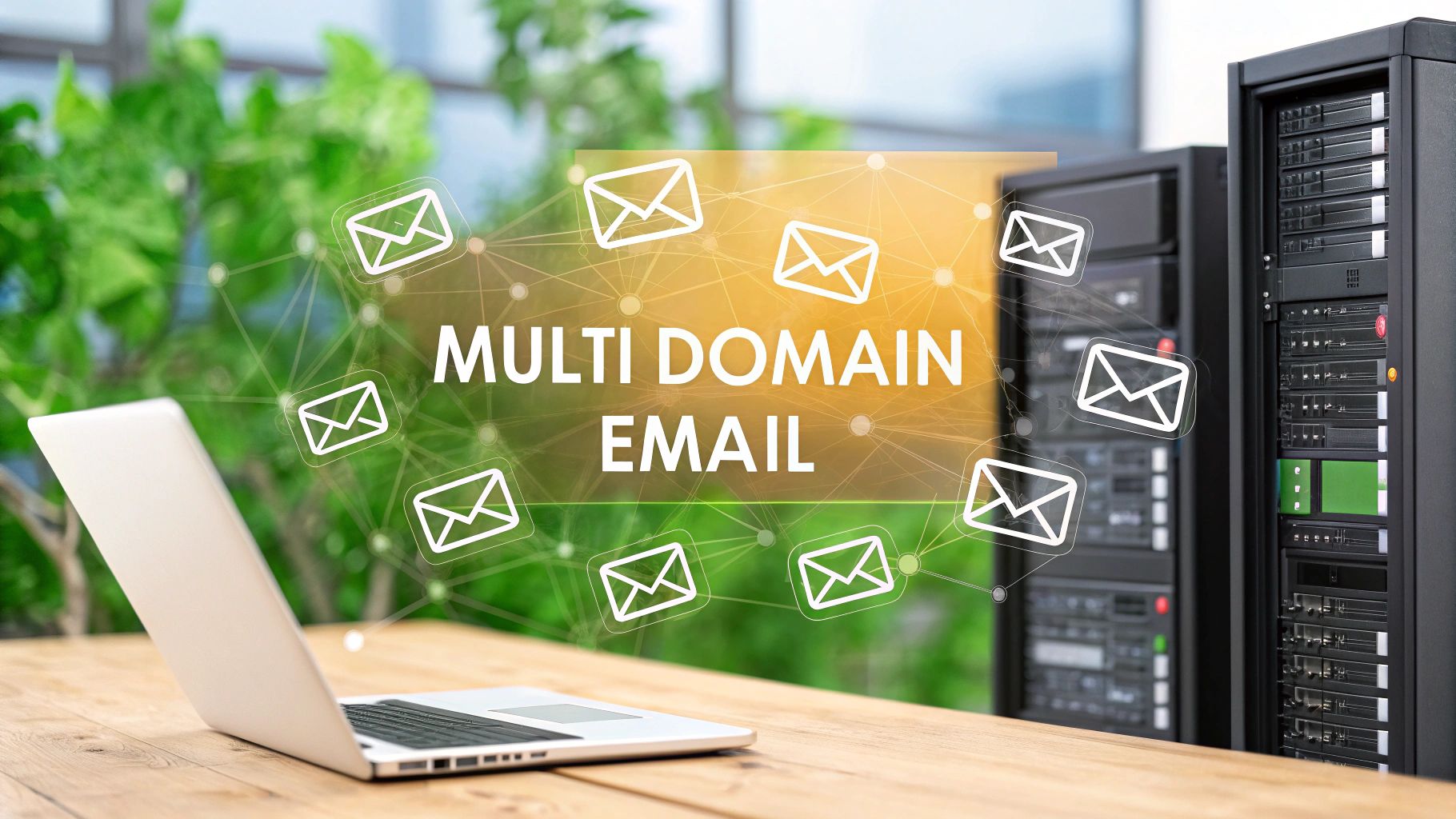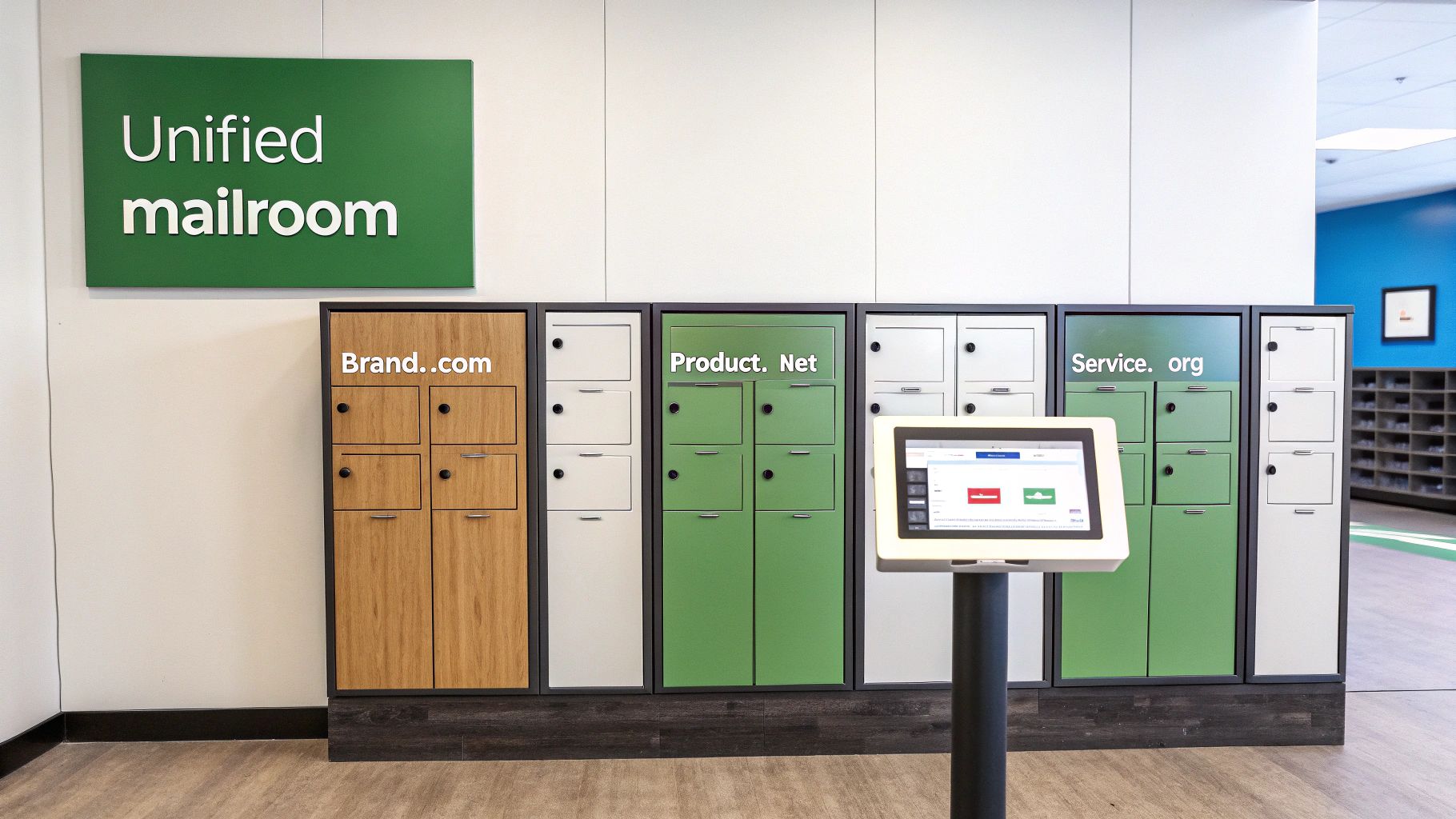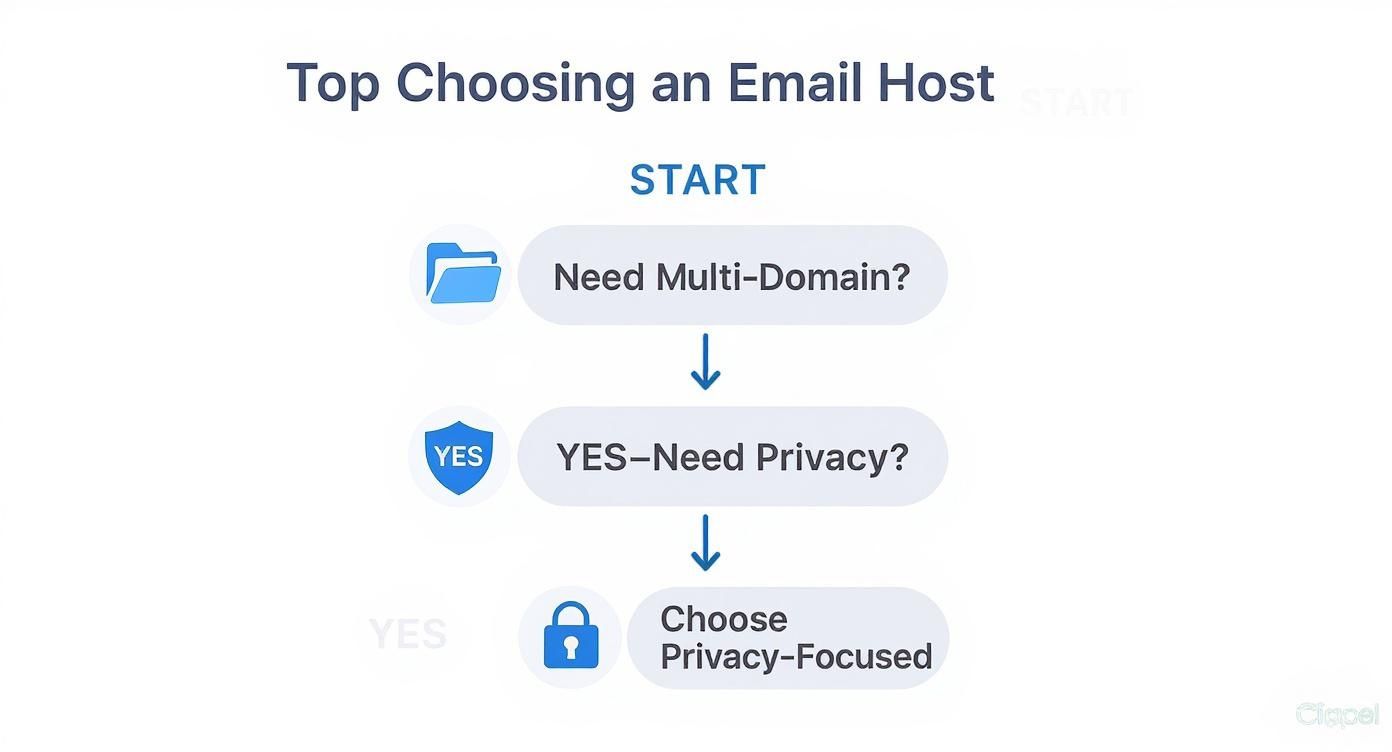To stop email spoofing, you need a defense-in-depth email security strategy. It’s a mix of technical email authentication protocols (like SPF, DKIM, and DMARC), tapping into the security features of your hosted email platform, and ensuring your team is continuously trained on what to look for. This approach is what stops attackers from impersonating your domain, protecting both your brand's privacy and your data.
The Real-World Cost of a Spoofed Email
Picture this: an urgent email lands in your finance team's inbox. It looks like it's from the CEO, requesting an immediate wire transfer. Everything seems right—the name, the signature, even the tone. But it's a fake. This isn't a far-fetched scenario; it’s a common tactic that businesses of all sizes face every day. This isn't just a tech headache; it's a direct threat to your email security, financial stability, and your company's good name.

The heart of the problem is just how easy it is for attackers to compromise your email privacy when strong security isn't in place. If your domain isn't locked down, anyone can send emails that look like they came from you, fooling employees, customers, and partners alike. The fallout can be severe.
The Ripple Effect of a Single Fake Email
A successful spoofing attack causes damage that spreads far beyond one fraudulent transaction. The consequences for your email security often include:
- Direct Financial Loss: Attackers can trick employees into making unauthorized wire transfers, paying fake invoices, or diverting payroll funds. These hits can be immediate and, in some cases, catastrophic.
- Reputational Damage: When scammers use your domain to blast out spam or phishing emails, the trust you've built with customers can evaporate overnight. This kind of damage can linger for years.
- Data Breaches and Privacy Violations: Spoofed emails are a favorite way for attackers to deliver malware or trick employees into giving up sensitive login details, which can quickly lead to a full-blown data breach and compromise your organization's privacy.
The scale of this vulnerability is staggering. It's alarming, but more than 90% of the world’s top email domains—we're talking major banks, government agencies, and global corporations—are wide open to spoofing because they haven't configured their email security properly. Even with the right tools available, only a tiny fraction have actually implemented the strictest email authentication policies needed to block these attacks cold.
Beyond the immediate financial sting, a spoofing attack can absolutely trash your company's online reputation. When public trust is on the line, it’s critical to have a plan, and resources like an ultimate reputation management guide can be invaluable for navigating the crisis.
At the end of the day, preventing email spoofing isn't just an IT task—it's a core business function. It’s about protecting your assets, ensuring email privacy, and preserving the hard-won trust you’ve built with everyone you do business with.
Building Your First Line of Defense with SPF and DKIM
To get a real handle on stopping email spoofing, you have to start with the fundamentals of email security. I like to think of Sender Policy Framework (SPF) and DomainKeys Identified Mail (DKIM) as your domain’s digital ID card and its tamper-proof seal. When you put them together, they create a powerful first line of defense that makes it incredibly difficult for attackers to impersonate you.
Getting these protocols in place isn't some complex, overwhelming project. It’s a straightforward security upgrade that pays off immediately. Essentially, you're creating public records in your DNS that other mail servers can check to confirm an email is actually from you. It's like a bouncer checking an ID at the door—if the name isn't on the list, they're not getting in.
Your Digital ID Card: Understanding SPF
First up is SPF (Sender Policy Framework). It's basically a public list you create that tells the world, "These are the only mail servers allowed to send email on behalf of my domain." When an email claiming to be from you arrives, the recipient's server quickly checks this list. If the server that sent the email isn't on your approved list, it immediately gets flagged as suspicious.
This one simple check is surprisingly effective at shutting down basic domain spoofing. It closes a massive loophole in email's original design by creating a verifiable link between an email and the server that sent it.
An SPF record is just a single line of text you add to your domain's DNS settings. It looks something like this:
v=spf1 include:_spf.google.com ~all
Let's break that down:
v=spf1: This just identifies the record as an SPF record. Standard stuff.include:_spf.google.com: This part specifies that Google Workspace servers are authorized to send email for this domain. Your own hosted email platform will give you the exact value to plug in here.~all: This is an instruction that tells receiving servers how to handle emails from unauthorized sources. In this case, it's a "soft fail," meaning they should be treated as suspicious.
You’ll typically add this record in your domain registrar’s control panel, whether you use GoDaddy, Namecheap, or Cloudflare. The whole process usually takes just a few minutes.
Sealing Your Emails with DKIM
While SPF confirms the server is legitimate, DKIM (DomainKeys Identified Mail) confirms the email's content hasn't been messed with, protecting the privacy of the message in transit. It's the digital equivalent of a wax seal on a medieval letter. DKIM works by using a pair of cryptographic keys—one private and one public—to create a unique digital signature for every single email you send.
Here’s a quick look at how it works in practice:
- Signing: Your email server uses its private key (which you keep secret) to add a unique, encrypted signature into the email's header right before it's sent.
- Verifying: The receiving mail server finds your public key, which you’ve published in your DNS, and uses it to verify the signature.
If the signature checks out, it proves two critical things: the email definitely came from an authorized server, and its content—including any attachments—is exactly as it was when it was sent. This is a huge win for email security and privacy, protecting your communications from man-in-the-middle attacks where someone might intercept and alter a legitimate email.
Setting up SPF and DKIM is the absolute cornerstone of a strong email security posture. It’s a proactive step that moves you from being a potential target to a well-defended domain, making it much harder for cybercriminals to leverage your good name.
To get started, you'll generate the DKIM keys right inside the admin console of your hosted email platform, like Google Workspace or Microsoft 365. The platform gives you the public key, you add it to your DNS, and you're all set.
For a deeper dive into how these protocols work together, you can find more information in our complete security guide to email authentication. By implementing both SPF and DKIM, you build a robust foundation that authenticates your messages and protects your reputation.
Using DMARC to Block Impersonation Attempts
You’ve got SPF and DKIM set up—think of them as your domain's official ID card and a tamper-proof seal on your messages. Now it’s time to bring in the enforcer: DMARC (Domain-based Message Authentication, Reporting, and Conformance).
DMARC is the final, crucial piece of the email security puzzle. It’s a clear set of instructions you publish that tells every mail server on the planet exactly what to do when they receive an email claiming to be from you that fails the SPF or DKIM checks. It's your most powerful tool for shutting down spoofing for good.
But you can't just flip a switch. A rushed DMARC deployment is a recipe for disaster, potentially blocking legitimate emails from your marketing team or even your customer service desk. The key is a phased approach that starts with visibility and moves carefully toward enforcement. This ensures you lock down your domain's email security without disrupting your business.
This infographic breaks down how SPF and DKIM work together, which is the foundation DMARC builds upon.

As you can see, SPF validates the sending server while DKIM verifies the message's integrity. DMARC needs both of these signals to work effectively.
Starting with Monitoring Only
The absolute best way to begin is with a "monitoring-only" policy. It's a no-risk first step that lets you gather essential email security intelligence. You simply add a DMARC record to your DNS that tells receiving servers, "Don't block anything yet, just send me a report on all the email activity you see for my domain."
Your first DMARC record will look something like this:
v=DMARC1; p=none; rua=mailto:dmarc-reports@yourdomain.com;
Let's quickly break down what those tags mean:
v=DMARC1: This is just a standard identifier that tells servers, "This is a DMARC record."p=none: This is the most important part for now. Thepstands for "policy," andnoneputs you in monitoring mode. No emails will be blocked, no matter what.rua=mailto:dmarc-reports@yourdomain.com: This tells servers where to send the aggregate reports. These daily XML reports give you a high-level summary of your email traffic.
Let this run for a few weeks, maybe even a month. You’ll start getting reports from mail servers all over the world, and they will reveal every single service sending email on your behalf—from your main hosted email platform to third-party tools like Mailchimp or Salesforce. This data is gold; it gives you a complete inventory of what’s legitimate and what’s not.
Analyzing Reports and Moving to Enforcement
Once you've combed through the reports and feel confident that all your legitimate sending services are correctly set up with SPF and DKIM, it's time to start tightening the screws. You'll gradually escalate your DMARC policy from just watching to actively enforcing.
This process involves moving through three distinct stages, starting with the p=none you already have in place.
DMARC Policy Implementation Stages
The table below outlines the three phases of a DMARC rollout. Moving through them methodically is the safest path to full enforcement and robust email security.
| Policy Level | DMARC Record Tag | Action Taken on Failing Emails | Primary Goal | Recommended Duration |
|---|---|---|---|---|
| Monitoring | p=none |
No action; email is delivered normally. | Gain visibility into all sending sources and identify authentication issues. | 2-4 weeks |
| Quarantine | p=quarantine |
Sent to the spam/junk folder. | Test the impact of enforcement by filtering suspicious mail without rejecting it. | 4-8 weeks |
| Reject | p=reject |
The email is completely blocked and not delivered. | Actively stop all unauthorized emails, achieving full spoofing protection. | Ongoing |
Each stage gives you more control and protection. The recommended durations are just a guideline; the key is to be confident in your data before moving to the next level.
The two enforcement stages are:
-
Quarantine (
p=quarantine): This is the perfect intermediate step. It tells receiving servers to treat unauthenticated emails as suspicious, usually by sending them straight to the recipient's spam folder. This dramatically reduces the visibility of fraudulent emails without the risk of outright blocking something important. -
Reject (
p=reject): This is the endgame. Arejectpolicy is a direct command to servers: "If an email fails DMARC, block it completely. Do not deliver it." This is the strongest possible defense, ensuring spoofed emails never even make it to a user's mailbox, safeguarding both security and privacy.
By moving methodically from
p=nonetop=quarantine, and finally top=reject, you systematically squeeze out all unauthorized email.
When you finally reach a full reject policy, you can be sure that only legitimate, authenticated emails are being delivered from your domain. It’s a powerful feeling knowing you’ve effectively slammed the door on impersonation attempts, protecting your brand and the people who trust it.
Turning On Your Hosted Email Platform's Best Defenses
Email authentication protocols like SPF, DKIM, and DMARC are the foundation of email security, but they shouldn't be your only line of defense. The hosted email platforms you use every day—think Google Workspace and Microsoft 365—are loaded with powerful security features that, frankly, most businesses never turn on. Activating these tools takes you from basic authentication to a much smarter, more dynamic layer of email security and privacy protection.
These hosted email platforms aren't static; they're constantly getting smarter. They use AI to scrutinize incoming mail in real-time, analyzing sender behavior, checking links for shady destinations, and even reading email content for subtle grammar mistakes common in phishing attacks. This is all about getting the most security and privacy bang for your buck from the tools you're already paying for.
Unlocking Advanced Threat Protection
So many businesses just stick with the default settings, leaving some of the most critical email security protections on the table. It’s time to pop the hood, get into your admin console, and enable the features designed to stop today's most sophisticated threats. Think of it as adding a highly trained security guard to your digital front door.
Here are the key features you should be looking for in your hosted email platform:
- Attachment Sandboxing: This is a game-changer. It automatically opens email attachments in a secure, isolated virtual environment to see what they do. If a file is malicious, it gets neutralized before it ever has a chance to land in an employee's inbox and compromise your security.
- Link Safety Checks: When you turn this on, the platform rewrites links in incoming emails to route them through its own scanner first. If a user clicks, the link is checked against a real-time database of malicious sites. If it's a known threat, access is blocked instantly.
- Impersonation Protection: This goes a step beyond basic spoofing. It uses AI to flag emails that try to mimic high-profile users (like your CEO) or use tricky display names, even if the email technically passes authentication checks.
These features create a vital safety net. For instance, modern email security filters now block about 81% of phishing emails on average, with platforms like Google Workspace and Microsoft 365 reporting detection rates as high as 92%. But here's the kicker: a staggering 47% of attacks using hidden links or image-based tricks still slip past basic filters. That's precisely why these advanced settings in your hosted email service are so critical.
Setting Up Visual Cues and Warnings
One of the simplest and most effective security boosts you can implement is giving your users clear visual warnings right in their inbox. These little nudges can be surprisingly powerful when an employee is rushing through dozens of emails.
Your team is busy. A well-designed warning can instantly break their routine, prompting them to pause and scrutinize an email they might have otherwise trusted. It's a small change that helps build a security-first mindset.
Most major hosted email platforms let you set up banners that automatically pop up on certain emails. You can configure custom warnings for messages coming from outside your organization or from brand-new domains. A simple banner reading, "CAUTION: This email originated from an external sender" immediately tells the user to be extra careful before clicking any links or opening attachments.
By turning on these built-in defenses, you’re finally using your hosted email platform’s full potential. You can find detailed breakdowns of the top hosted email platforms for business security to see how different providers compare in these areas. This approach adds a tough, intelligent layer of protection that works hand-in-hand with your authentication records to keep your organization safe.
Creating a Human Firewall to Spot Advanced Threats
Even with the best technical defenses in place, a well-crafted social engineering attack can still slip through. This is where your people come in. They are the final—and frankly, the most important—layer of your email security. The goal is to transform your employees from potential targets into a proactive "human firewall" that actively defends against email spoofing and other attacks that threaten your security and privacy.

Real security awareness goes way beyond a simple checklist of red flags. It's about getting your team to instinctively question unusual urgency, spot those cleverly disguised look-alike domains, and feel empowered to challenge a suspicious request for payment, even if it looks like it came straight from the CEO.
Building Practical Experience Through Simulation
So, how do you build that instinct? The best way I've found is through hands-on practice in a totally safe environment. Running regular, simulated phishing campaigns is an incredible tool for building this kind of muscle memory without any of the real-world risk. It lets your team see what these attacks actually look like in their own inbox.
The numbers back this up, too. Organizations that run these simulations see huge improvements. One study showed that simulated phishing cut real click rates by 76%. Even more telling, companies that ran monthly training saw their employees' click rates on malicious links drop from 34% to just 4.6% in a single year. You can see more data on how phishing trends impact businesses on keepnetlabs.com.
A well-trained employee doesn't just protect themselves; they become a sensor for your entire organization. When they spot something suspicious, they're providing valuable threat intelligence that can protect everyone's email security.
Cultivating a Culture of Security
Training is crucial, but it’s only half the equation. You also need to build a culture where reporting a suspicious email is easy and, most importantly, blame-free. When people feel safe raising a flag without worrying they'll be shamed for it, they’re far more likely to report potential threats right away. This turns them from passive targets into active defenders of your email privacy.
Getting this cultural piece right is a game-changer. Here’s how to start:
- Establish a simple reporting channel: Make it dead simple. A dedicated email address like
phishing@yourcompany.comor a one-click "report phish" button in their email client works wonders. - Acknowledge every report: Always thank employees for being vigilant. This small step reinforces that they did the right thing, no matter the outcome.
- Share successes: When someone reports an email that turns out to be a real threat, share that story (anonymously, of course). It’s a powerful way to show the team that their actions are making a real difference.
This blend of practical training and a supportive culture is what truly works. You can take these ideas even further by checking out this comprehensive guide to information security awareness training. In the end, this approach empowers your team to become your single greatest security asset.
Got Questions About Preventing Email Spoofing? We've Got Answers.
As you start digging into email authentication, a few questions always seem to pop up. It's totally normal. Let's walk through some of the most common concerns I hear from people trying to lock down their email security for the first time.
Is Spoofing the Same Thing as Phishing?
This is easily the most common point of confusion, and it’s a great question. The simplest way to think about it is that spoofing is the disguise, and phishing is the crime.
Spoofing is the technical trick of faking the "From" address in an email. The goal is to make it look like the message came from someone you know and trust, like your boss or your bank.
Phishing, on the other hand, is the malicious act itself. It’s the attempt to fool you into giving up sensitive information, clicking a bad link, or wiring money to a scammer. Spoofing is just one of the most effective tools in a phisher's toolkit because it undermines email security by making their bait look so much more convincing.
Will DMARC Accidentally Block My Own Emails?
This is a big—and very valid—fear. Nobody wants to implement an email security protocol only to find out their marketing newsletters or transactional emails are getting sent to spam. The good news is, this is entirely preventable if you roll out DMARC correctly. The trick is to never, ever jump straight to a p=reject policy.
Start with DMARC in monitoring mode by setting your policy to
p=none. This is your safety net. It tells receiving servers not to block anything, but to send you detailed reports on who is sending email from your domain.
These DMARC reports are pure gold. They give you a complete picture of every service sending email on your behalf—the good, the bad, and the forgotten. You’ll see your legitimate hosted email platform, your CRM, newsletter service, and maybe even some old service you forgot about.
Armed with that data, you can go back and properly authorize all your legitimate senders in your SPF and DKIM records. Once you're confident all your real mail is authenticated, you can slowly ramp up your policy to p=quarantine and, eventually, p=reject. It's a crawl, walk, run approach that ensures you don't disrupt your business operations.
Are SPF, DKIM, and DMARC a Silver Bullet?
So, once you have these three set up, are you 100% safe from spoofing? Almost, but not quite. SPF, DKIM, and DMARC are incredibly powerful and are the absolute best defense against direct domain spoofing. That's when a cybercriminal uses your exact domain name (like ceo@yourcompany.com) in an attack.
However, they can't stop attacks from look-alike domains. Think ceo@yourc**0**mpany.com (with a zero instead of an 'o') or ceo@yourcompany-support.com. Your hosted email platform's filters might catch these, but DMARC on its own won't.
That’s why these protocols are a critical piece of a larger security puzzle. A strong DMARC policy, combined with advanced threat protection from your hosted email platform and, most importantly, ongoing employee security training, creates a layered defense that protects your privacy and security from all angles.
Ready to take full control of your email privacy and security? Typewire offers secure, private email hosting that puts you in charge. With no ads, no tracking, and powerful anti-spam filters, you can communicate with confidence. Start your free trial today.





